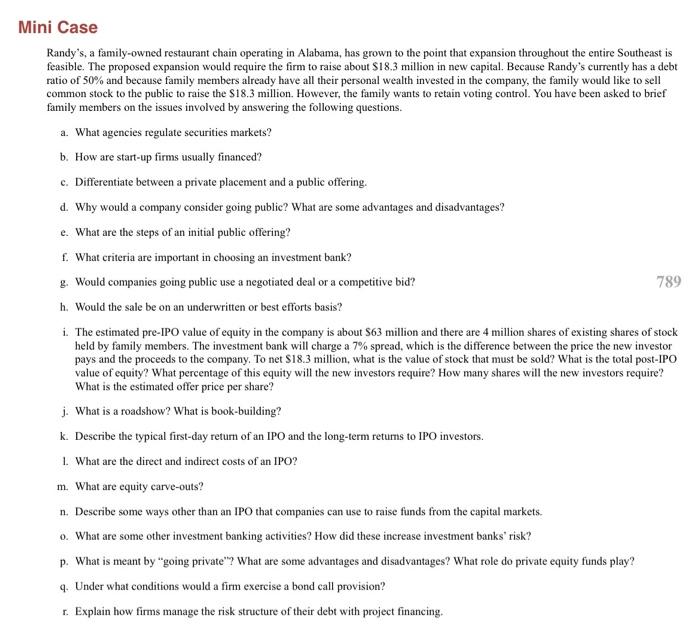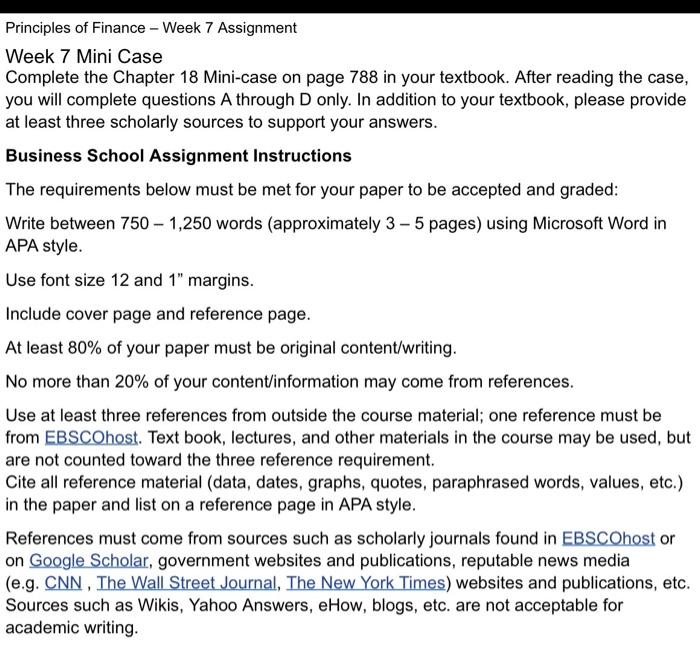Mini Case Randy's, a family-owned restaurant chain operating in Alabama, has grown to the point that expansion throughout the entire Southeast is feasible. The proposed expansion would require the firm to raise about $18.3 million in new capital. Because Randy's currently has a debt ratio of 50% and because family members already have all their personal wealth invested in the company, the family would like to sell common stock to the public to raise the $18.3 million. However, the family wants to retain voting control. You have been asked to brief family members on the issues involved by answering the following questions. a. What agencies regulate securities markets? b. How are start-up firms usually financed? c. Differentiate between a private placement and a public offering. d. Why would a company consider going public? What are some advantages and disadvantages? e. What are the steps of an initial public offering? 1. What criteria are important in choosing an investment bank? g. Would companies going public use a negotiated deal or a competitive bid? 789 h. Would the sale be on an underwritten or best efforts basis? i. The estimated pre-IPO value of equity in the company is about $63 million and there are 4 million shares of existing shares of stock held by family members. The investment bank will charge a 7% spread, which is the difference between the price the new investor pays and the proceeds to the company. To net 18.3 million, what is the value of stock that must be sold? What is the total post-IPO value of equity? What percentage of this equity will the new investors require? How many shares will the new investors require? What is the estimated offer price per share? j. What is a roadshow? What is book-building? k. Describe the typical first-day return of an IPO and the long-term returns to IPO investors. 1. What are the direct and indirect costs of an IPO? m. What are equity carve-outs? n. Describe some ways other than an IPO that companies can use to raise funds from the capital markets. 0. What are some other investment banking activities? How did these increase investment banks' risk? p. What is meant by "going private"? What are some advantages and disadvantages? What role do private equity funds play? 4. Under what conditions would a firm exercise a bond call provision? r. Explain how firms manage the risk structure of their debt with project financing, Principles of Finance - Week 7 Assignment Week 7 Mini Case Complete the Chapter 18 Mini-case on page 788 in your textbook. After reading the case, you will complete questions A through D only. In addition to your textbook, please provide at least three scholarly sources to support your answers. Business School Assignment Instructions The requirements below must be met for your paper to be accepted and graded: Write between 750 - 1,250 words (approximately 3 - 5 pages) using Microsoft Word in APA style. Use font size 12 and 1" margins. Include cover page and reference page. At least 80% of your paper must be original content/writing. No more than 20% of your content/information may come from references. Use at least three references from outside the course material; one reference must be from EBSCOhost. Text book, lectures, and other materials in the course may be used, but are not counted toward the three reference requirement. Cite all reference material (data, dates, graphs, quotes, paraphrased words, values, etc.) in the paper and list on a reference page in APA style. References must come from sources such as scholarly journals found in EBSCOhost or on Google Scholar, government websites and publications, reputable news media (e.g. CNN, The Wall Street Journal, The New York Times) websites and publications, etc. Sources such as Wikis, Yahoo Answers, eHow, blogs, etc. are not acceptable for academic writing








